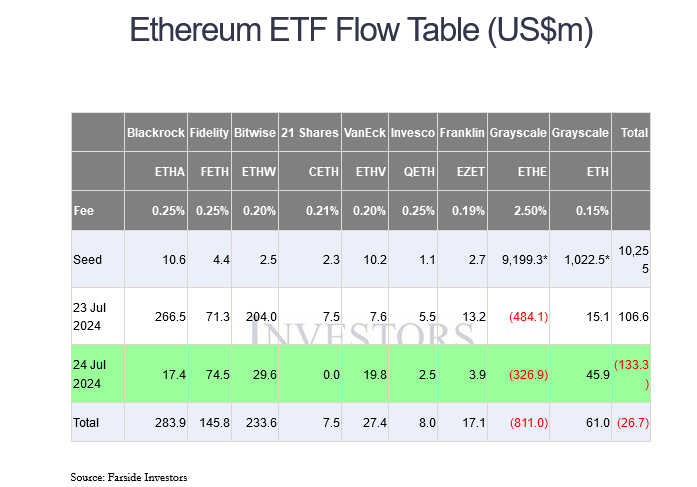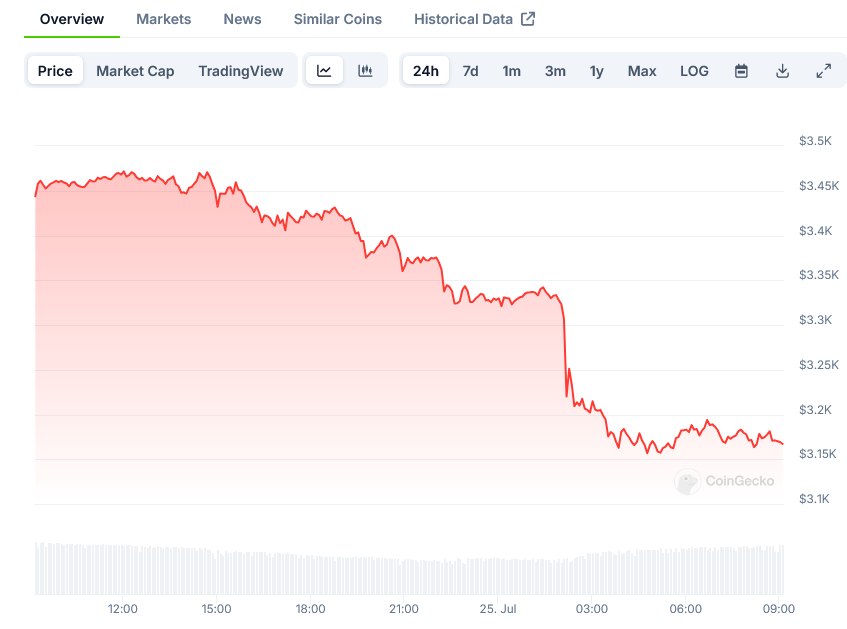TLDR
- Spot Ethereum ETFs experienced net outflows of $113-133 million on their second day of trading.
- Grayscale’s Ethereum Trust (ETHE) saw significant outflows of $326.9 million on the second day.
- Most new Ethereum ETFs posted positive inflows, with Fidelity and Bitwise leading.
- The Ethereum price dropped about 7-8% amid the ETF outflows and broader market sell-off.
- The total outflow from ETHE reached $811 million over the first two trading days.
The recently launched spot Ethereum exchange-traded funds (ETFs) in the United States have experienced a mixed start, with significant outflows on their second day of trading.
According to data from Farside Investors, the ETFs saw net outflows between $113 million and $133 million on July 24, just one day after their debut.
This turn of events comes after a strong start on the first trading day, when the ETFs recorded over $1 billion in trading volume and $106.6 million in net inflows.
However, the second day told a different story, with the majority of the outflows coming from a single source.
Grayscale’s Ethereum Trust (ETHE), which recently converted to a spot ETF, experienced the largest outflows. On July 24, ETHE saw $326.9 million leave the fund, contributing to a total of $811 million in outflows over its first two days as an ETF.

This selling pressure from ETHE overshadowed the positive inflows seen by most of the newly launched Ethereum ETFs.
Despite the overall negative flow, seven of the eight new Ethereum ETFs actually posted positive inflows on their second day. The Fidelity Ethereum Fund (FETH) led the pack with $74.5 million in inflows, followed by the Bitwise Ethereum ETF (BITW) with $29.6 million.
Other ETFs, including those from WisdomTree, VanEck, and BlackRock, also saw positive inflows, albeit smaller amounts.
The outflows coincided with a significant drop in Ethereum’s price. ETH fell by approximately 7-8% over 24 hours, trading around $3,170 at the time of reporting.
This price movement occurred alongside a broader sell-off in both the cryptocurrency and traditional equity markets, with the S&P 500 closing down 2.3% on July 24.
Analysts note that Ethereum’s price action was more pronounced than that of Bitcoin, which only fell about 2.6% during the same period. This aligns with predictions that ETH’s price could be particularly sensitive to ETF inflows and outflows in the early days of trading.

The performance of Ethereum ETFs isn’t without precedent. Bitcoin ETFs, which launched earlier, also experienced net outflows in six out of their first ten trading days. Many attributed those outflows to selling pressure from the Grayscale Bitcoin Trust ETF, similar to what we’re seeing with ETHE now.
It’s worth noting that the conversion of Grayscale’s Ethereum Trust to an ETF removed a six-month lock-up period on investments, allowing existing investors to sell their holdings more easily. This change likely contributed to the significant outflows seen from ETHE in its first days as an ETF.





